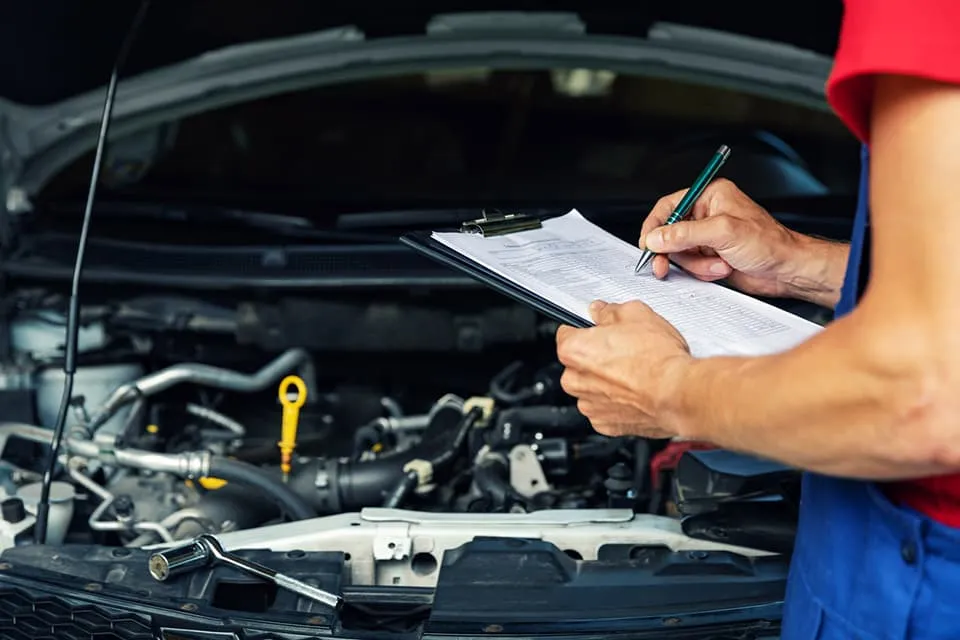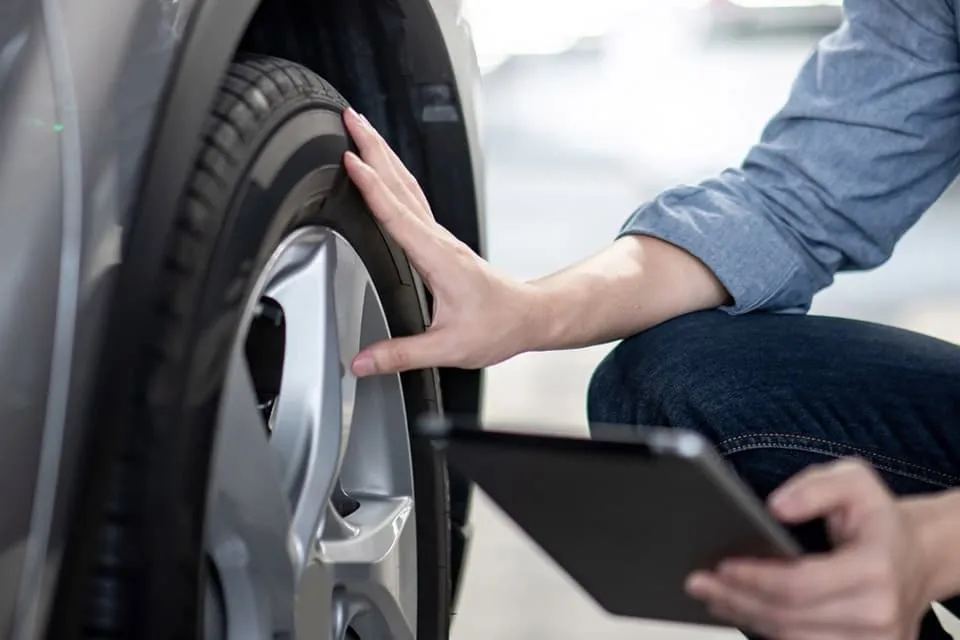- Do Vehicle Inspections Reduce Accidents? The Global and US Perspective
- Key Takeaways
- What States Do Not Require Vehicle Inspections?
- Is There a Link Between Inspections and Crash Rates?
- What Are the International Laws for Vehicle Inspections?
- What is the Cost of Vehicle Inspections?
- How Do Vehicle Inspections Affect Insurance Premiums?
Do Vehicle Inspections Reduce Accidents? The Global and US Perspective

For most people, connecting mandated vehicle inspections to increased road safety is a natural and logical leap. However, results from national crash data and academic research are inconclusive regarding the direct benefits.
This lack of consensus is primarily due to challenges in attributing increases or decreases in crash fatality rates to any single factor.
"Data on whether mandatory inspections directly reduce accidents is mixed, largely because mechanical failures are a smaller percentage of crash causes compared to driver behavior. However, inspections do help catch critical issues, especially with brakes, tires, and steering systems, before they cause accidents," shares Christopher Migliaccio, the Co-Founder and Managing Partner at Warren & Migliaccio, L.L.P.
While definitive results are lacking, considerable observational studies do support a connection, particularly when comparing US road fatalities to those of first-world counterparts with stricter inspection legislation.
Key Takeaways
- 13 U.S. states don’t require any regular vehicle inspections (safety or emissions).
- 90%+ of EU countries have mandatory inspections every 1-2 years.
- States with mandatory inspections show a 5-9% reduction in crash rates.
- Vehicle malfunctions contribute to 3% to 20% of accidents in developed countries.
- The average annual cost of vehicle inspections in the U.S. is $20–$70, while in Japan, the cost is $400–$500 every two years.
- States with no inspections (e.g., South Carolina) have a fatality rate of 23.1 deaths per 100k people, while states with inspections like California have 10.9 deaths per 100k people.
What States Do Not Require Vehicle Inspections?
Only 13 states do not require regualr safety, emissions, or VIN inspections for vehicles owned by residents. These states are Alaska, Arkansas, Iowa, Michigan, Minnesota, Mississippi, Montana, North Dakota, South Carolina, South Dakota, Florida, Washington, and Wyoming. While some of these states may require a one-time inspection when registering an out-of-state vehicle, they do mandate annual or biennial inspections for vehicles already registered within the state. If you’re wondering which states don’t require car inspections or emissions testing, these 13 are your answer. On the flip side, most other states do require emissions testing, especially in urban areas, to meet environmental standards and reduce air pollution.
For states with vehicle inspections, various requirements must be met to stay in compliance.
Vehicle Inspections by State
| Name of State | Inspection Requirements |
|---|---|
| Arizona | Biennial emissions inspections for Phoenix and Tucson metro areas |
| California | Biennial emissions inspections for out-of-state cars or in-state vehicles seven years or older (in 41 of 58 counties) |
| Colorado | Biennial emissions inspections in 9 out of 64 counties (with some exceptions for vehicles 7 model years old or newer) |
| Connecticut | Biennial emissions inspections are required |
| Delaware | Biennial safety and emissions inspections required |
| District of Columbia | Biennial emissions inspection required |
| Georgia | Annual emissions inspections for the Atlanta metro area |
| Hawaii | Annual safety inspections required |
| Idaho | Periodic emissions inspections are required for Lake and Porter counties |
| Louisiana | Annually and Biennial safety inspections are required, in addition to annual emissions inspections for the Baton Rouge metro area (Brake tag inspections are required for New Orleans area vehicles) |
| Maine | Annual safety inspections are required, in addition to annual emissions inspections for vehicles registered in Cumberland County |
| Maryland | Biennial emissions inspections are required for 13 of 23 counties |
| Massachusetts | Annual safety and emissions inspections required |
| Missouri | Biennial safety inspections are required for the whole state, with biennial emissions inspections required for the St. Louis metro area |
| Nevada | Annual emissions inspections are required for urban areas of Clark and Washoe County (with some vehicle exceptions) |
| New Hampshire | Annual safety inspections are required for all vehicles, with annual emissions inspections required for models less than 20 years old |
| New Jersey | Vehicles are exempt from inspections for the first five years, then biennial emissions testing is required |
| New Mexico | Biennial emissions testing required for Bernalillo County |
| North Carolina | Annual safety inspections are required, with annual emissions inspections for 22 out of 100 counties |
| Ohio | Odd/even emissions testing required for Cleveland metro area |
| Oregon | Periodic emissions inspections are required for Portland and Medford metro areas |
| Pennsylvania | Annual safety inspections are required, with annual emissions inspections in 25 of 67 counties |
| Rhode Island | Biennial safety and emissions inspections required |
| Texas | Annual safety inspections are required, with annual emissions inspections for large urban areas |
| Utah | Periodic emissions testing is required for the four most populated counties |
| Vermont | Annual safety and emissions testing required |
| Virginia | Annual safety inspections are required, with biennial emissions testing for urban and suburban areas of northern Virginia |
| West Virginia | Annual safety inspections required |
| Wisconsin | Biennial emissions inspections are required for select counties |
Is There a Link Between Inspections and Crash Rates?
The chart below details ten US states that do not require vehicle owners to inspect their vehicles for safety periodically. The data is taken from a 2023 Institute of Highway Safety(IIHS) study.
| Name of State | Inspection Requirements |
|---|---|
| State | Deaths per 100,000 Populace |
| South Carolina | 19.5 |
| Mississippi | 24.9 |
| Arkansas | 19.4 |
| Montana | 18.4 |
| Florida | 15.0 |
| Arizona | 19.5 |
| Texas | 14.1 |
| Georgia | 14.6 |
| Alabama | 19.1 |
| Wyoming | 24.7 |
For reference, the lowest crash fatality rates are from Massachusetts (4.9), New York (5.7), and New Jersey (6.5). Each of these states requires annual or biennial vehicle safety inspections, as do many of the other states with low fatality rates.
In 2023, the average crash fatality rate in the US was 12.2 deaths per 100,000 people, according to the same IIHS study. The above ten states were all substantially above that average.
These numbers are not irrefutable proof of an inspection's effect on crash and vehicle fatality rates. Aspects such as driver behavior, vehicle age, and road laws can also contribute to higher deaths. However, it is worthwhile to investigate how practical an inspection can be.
Research indicates that states with mandatory inspection programs see 5 to 9 percent fewer crashes. This decrease can be attributed to the fact that mechanical failures account for between 3 and 19 percent of overall road crashes in developed countries, and this number goes up in developing countries.
The same study compared Alabama vehicle crash rates for vehicles that did and did not go through an inspection process. The researchers found that vehicles that underwent inspection crashed 9.1 percent less than their counterparts.
Another report from Carnegie Mellon University found that states that repealed their Vehicle Inspection and Maintenance Programs experienced increased road fatalities after five years. These repeals occurred after the year 2000, when overall crash rates were steadily decreasing.
Overall, it is difficult to precisely connect the lack of mandatory inspections to increased fatality rates. Observational studies are limited as they cannot completely confirm the driver's ability or the exact conditions of the crash.
What Are the International Laws for Vehicle Inspections?

There isn't a global overseeing body for vehicle inspections. This lack leads to different inspection policies in every country. Variations extend past inspection regularity. Some governments enforce advanced safety features, weight penalties, and entrance inspections.
These more comprehensive inspection routines can be more expensive for vehicle owners but are linked to lower crash fatality rates.
US Vehicle Inspections
The US government leaves vehicle inspection requirements to individual state and county governments. This can create large disparities in crash statistics within the country.
- Safety Inspections Requirements: Set by each state or county. Most states mandate a check either every one or two years. Others, like Alaska, do not require any safety inspections.
- Emission Inspection Requirements: Set by each state or county. These tests are often restricted to relatively modern cars.
- Inspection Content: Mechanics check for signs of future failure, such as draining liquid, damaged chassis, or excessive wear on key components like tires or brake pads. They do not confirm
- Cost Range: $20 to $150, depending on the state and inspection type.
Canada Vehicle Inspections
Canada also has different inspection mandates based on the province. Private inspections are delivered by authorized mechanics in accordance with Canada's Private Vehicle Inspection Program (PVIP).
- Safety Inspections Requirements: Regulations vary by province. Many provinces require annual or biennial checks. Other areas only require inspection when registering the vehicle from another jurisdiction, for a sale, or after a wreck.
- Emission Inspection Requirements: No national emission requirements. These tests are not commonly required for private vehicles, but are stricter for commercial vehicles.
- Inspection Content: Mechanics check critical safety components like brakes, lights, tires, suspension, and fluid levels.
- Cost Range: $100 to $200 CAD, depending on the location.
EU Vehicle Inspections
The EU is initiating programs to reduce crash fatality rates to zero. One of their methods is to improve the competencies of testing facilities and inspectors. “Many European countries operate state-run inspection stations, where inspections are standardized, impartial, and typically performed annually on every vehicle.” states Rushit Hila, the founder of YOUCANIC
These more frequent inspections and improved safety technology regulations have decreased road deaths by 16 percent in the past decade.
- Safety Inspections Requirements: In nearly all member states, annual or biennial checks are required. Commercial vehicles are subject to unannounced roadside inspections.
- Emission Inspection Requirements: Every EU country requires emissions testing. Personal vehicles are repeatedly tested once the model is out for a few years, becoming exempt after a certain age.
- Inspection Content: Inspectors must be authorized by a member state or certified testing facility. Inspections cover the typical safety features and check driver-assistance technologies when applicable.
- Cost Range: Varies in each member state, but is typically between $150 and $300.
Japanese Vehicle Inspections
Japan has an even lower vehicle death rate than most EU countries. Japanese Compulsory Insurance (JCI) inspections, also known as Shaken, are more comprehensive than in America.
- Safety Inspections Requirements: Inspections must be performed every two years at a government-approved mechanic or inspection center.
- Emission Inspection Requirements: Emissions testing is required as part of the standard inspection.
- Inspection Content: Inspectors check the vehicle’s condition, safety components, and illegal modifications. Vehicles are also assigned a weight tax and mandatory 2-year insurance.
- Cost Range: $400 to $500 USD, depending on the state and inspection type.
Impact of Inspection Frequency
Although not the only factor in lowering road death rates, biennial or annual inspections appear to be advantageous. The EU has an average fatality rate of 4.4 per 100,000 people, and Japan's is even lower, at 2.6.
Both the EU and Japan have more standardized and thorough safety inspection processes that catch issues leading to malfunctioning brakes, tire blowouts, or steering failure. By contrast, the inconsistent quality of US inspections may leave more room for missed defects, resulting in increased crashes.
What is the Cost of Vehicle Inspections?

Some vehicle owners avoid inspections due to the off-putting costs. However, periodic preventative expenses are far more manageable than paying for repairs after an accident.
“The cost argument against inspections falls apart when you see the real numbers. My customers who do voluntary annual inspections spend about $200-300 yearly on preventive maintenance. Those who skip inspections? They're looking at $1,200-2,000 emergency repairs…” - states James Stephens, the owner of Gower's Brake & Alignment.
Below are the expected cost ranges for basic inspections in different regions:
- United States: $20 to $150
- EU Member States: $120 to $270
- Japan: $400 to $500
The average cost of vehicle inspections is higher in more safety-focused countries. However, the EU and Japan typically bundle multiple processes into their inspections, such as calculating taxes and registering insurance.
Japanese and many EU countries’ inspections only occur biannually. This means that their overall cost is more similar to that of American vehicle owners who participate in annual checkups.
How Do Vehicle Inspections Affect Insurance Premiums?
Insurance companies price customers based on their risk of filing a claim. Passing inspections indicates that the vehicle is in good condition and is less likely to be involved in a mechanically-caused accident.
“When I review accident reports, cars in non-inspection states are about 30% more likely to have accidents attributed to preventable mechanical problems. This data directly influences how insurance companies set rates by state,” shares Jeffrey Joseph, VP at Mitchell-Joseph Insurance.
Vehicle issues like blown tires account for 3 to 19 percent of crashes in developed countries. Even at its lowest, three percent is more than enough to catch an insurer's eye.
An analysis of Alabama vehicles has found that uninspected vehicles were up to 9.1 percent more likely to be involved in a crash. Additionally, another study found that vehicles with a defect were up to 3.5 times more likely to result in a fatality.
Performing a routine inspection can address both these issues from an insurance agency's point of view. This step is frequently required when shopping for higher-tier coverage or to secure lower premiums.
What Studies Say About Inspections Preventing Vehicle Failures
Critics of stronger inspection regulations state that maintaining dedicated testing facilities is not cost-efficient. They claim those funds would be better allocated to improving general road infrastructure and programs that help put people in more modern, safety-enhanced vehicles.
Many states have repealed their mandatory inspection protocols. These states also point to unchanged fatality rates or crashes after repealing inspection programs.
However, some experts note that limitations in crash data may cause an under-recording of vehicle-defect-attributed crashes. Results are mixed, but some studies show that vehicles can benefit from safety inspections.
For example, an estimation of Pennsylvania's vehicle safety inspection program expected up to 169 fewer fatal crashes due to more widespread inspections. This difference appeared most prominently in vehicles between 3 and 9 years old.
International Comparisons
Many developed nations have lower vehicle fatality rates than the US, and they have adopted stricter inspection programs and automotive safety requirements.
- Japan's "Shaken" Program: Requires all vehicles over three years old to be inspected biennially. Approved mechanics confirm the vehicle's safety features and physical condition to a rigorous standard. The $400 to $500 USD cost covers the inspection and other government-required vehicle fees.
- The European Union: The EU ensures roadworthiness through on-site and roadside inspections. Europe requires vehicles to include additional safety features such as automatic braking, causing inspections to be more comprehensive than in the US. The costs range depending on the country, but are typically between $100 and $300 USD.
- Canada: Inspection requirements in Canada are similar to those in the US. Most provinces require periodic inspections, but some only require inspection after a crash or when first entering the jurisdiction
- Do Vehicle Inspections Reduce Accidents? The Global and US Perspective
- Key Takeaways
- What States Do Not Require Vehicle Inspections?
- Is There a Link Between Inspections and Crash Rates?
- What Are the International Laws for Vehicle Inspections?
- What is the Cost of Vehicle Inspections?
- How Do Vehicle Inspections Affect Insurance Premiums?
FREE Vehicle Search
- Accidents
- Problem Checks
- Title Records
- Recalls
- Values
- Specs
-
InfoPay, Inc. (dba GoodCar) is an Approved NMVTIS Data Provider
-
-































